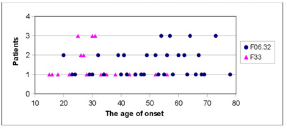No CrossRef data available.
Article contents
EPA-1354 – The age of onset and Causality of Organic Depressive Disorder
Published online by Cambridge University Press: 15 April 2020
Abstract
Currently there exists a need of individualized approach to the diagnostics and treatment of organic depression.
is to explore the relationship between age of onset and the etiological factors of organic depressive disorder (F06.32 according to ICD-10).
clinical, clinical-psychopathological, anamnestical-catamnestical, statistical.
50 patients with organic depressive disorder (F06.32) in comparing to 25 patients with major depressive disorder (F33) were studied.

Differences in age of onset is shown in the Figure 1.
Distribution of patients with organic depressive disorder (n = 50) and recurrent depressive disorder (n = 25) by age of manifest.
Overall age of onset of depression in patients with organic depressive disorder was significantly later than in patients with recurrent depressivedisorder (p<0.05).
The patients with organic depressive disorder with onset after 45 years constitute relatively homogeneous pool, with a clear tendency to separate from the rest of the patient`s population. They have a different spectrum of etiologic factors compared to patients with earlier onset of disease.
Births, episyndrome and infectious-allergic encephalopathy as etiologic factors identified in our material only in patients with onset younger than 45 years. Coronary heart disease, myocardial infarction, atherosclerotic encephalopathy, operations, pancreatitis were identified only after 45 years.
Hypertension was more common after age 45. An uncertain etiological factor is much greater in case of late onset. An earlier onset was characterized by more clear causality of depression.
These data support the view of the necessity of separation involutional depression from the other depressive disorders.
- Type
- P08 - Depression
- Information
- Copyright
- Copyright © European Psychiatric Association 2014



Comments
No Comments have been published for this article.